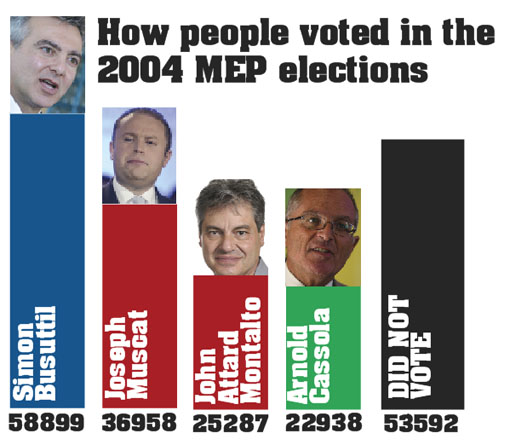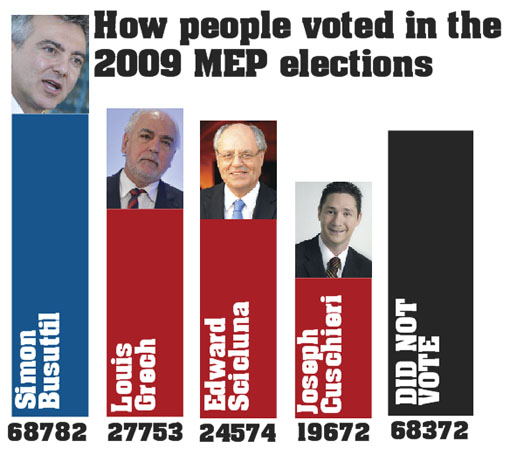If the past two European Parliament elections are any indication, one should likely not wonder whether the Nationalist Party will make gains after losing last year’s general election by a considerable margin.
Instead, what will likely be key to next month’s election results, will be just how many votes will be lost by each of Malta’s two main parties.
Both the Labour and Nationalist parties are hoping for effectively the same result in next month’s election, and both are seemingly prepared to present it as a historical achievement.
The Labour Party is simply angling to obtain more votes than the Nationalist Party, and steadfastly refuses to entertain any hopes of retaining its fourth seat in the European Parliament. But it will still be celebrating if this happens, as the first party in government to “win” a European election.
The PN, on the other hand, is hoping to win a third seat – again, presenting it as a historic first for the party – whilst downplaying its chances of obtaining more votes than Labour.
Of course, since this is only the third time that Malta is involved in the European Parliament elections, finding a historical first should not be particularly hard. But both parties have failed, so far, to register one particular achievement: obtaining more votes in the European election than they had in the previous general election.
To some extent, both the 2004 and 2009 European elections have been presented as a turnaround for a Labour Party that had last been in government in 1998. But the result boiled down to Labour losing far less votes than the Nationalist Party did, as people were more likely to vote for third parties and far more likely not to vote at all.
The 118,983 first-count votes obtained by Labour Party candidates in 2004 represented a drop of 15,109 when compared to the results of the previous year’s general election. The party improved on its result in 2009 to secure 135,917 votes, but even this represented a loss of votes: it had obtained 141,888 votes in the 2008 general election it lost by fewer than 2,000 votes.
But Labour registered a relative improvement as the PN lost nearly a third of its vote in both elections. While it had obtained 146,172 votes in the 2003 general election and 143,468 five years later, it only scraped up 97,688 votes in 2004 and 100,486 in 2009.
Once more, turnout for the European election is likely to be lower than the 93.8 per cent turnout registered in last year’s general election, making it highly likely that neither party will better last year’s result in terms of votes. The PN may have lost the 2013 election by 35,107 votes, but even a relatively good performance next month may see it secure fewer votes than the 132,426 it received last year.
Alternattiva Demokratika, on the other hand, has fared better in EP elections than it has in national ones.
After winning just 1,929 first-count votes in the 2003 election, its sole candidate Arnold Cassola obtained a comparatively staggering 22,938 first-count votes in 2004. The party’s performance in 2009 was considerably less impressive, but its 5,802 first-count votes still represented a considerable increase over the 3,810 votes registered in the 2008 general election.
Independent candidates or those belonging to other parties obtained a total of 6,049 votes in 2004, and a total of 5,964 five years later.
In both cases, the majority of these votes went to a single candidates: FKNK secretary Lino Farrugia had obtained 3,119 votes in 2004, while Imperium Europa leader Norman Lowell obtained 3,559 votes five years later.
Little past success for incumbent and former MPs
The number of candidates increased from 27 in 2004 to 34 five years later, but is down to 33 this year. However, the number of candidates presented by the Labour and Nationalist parties is increasing with every election.
Both parties were represented by eight candidates in 2004, but the number of PN candidates went up to 10 in 2009 and to 11 this year. Labour, on the other hand, fielded 12 candidates in 2009 and has approved a list of 13 candidates for next month’s election.

In both elections, voters’ most popular choice was to vote for Simon Busuttil: he received 58,899 first-count votes in 2004 and a record 68,782 five years later.

But the second most popular choice was not to vote at all: 53,592 did not vote in 2004, and 68,372 stayed away from the voting booth five years later. In the apparent absence of such a clear front-runner in the two largest parties – Dr Busuttil had obtained an absolute majority of his party’s votes in the next election – not voting will likely be the most popular choice this year: it remains to be seen whether a larger number of voters will be skipping next month’s election.
The third-most popular choice was the leading Labour Party candidate: Joseph Muscat with 36,958 votes in 2004 and Louis Grech with 27,753 in 2009.
Only eight of those who contested in the past two elections were either sitting or former MPs, and only two of them ended up winning a seat in the EP.
Three incumbent MPs – Labour MPs John Attard Montalto and Joe Debono Grech and Nationalist MP Anton Tabone – had contested in 2004, whereas no incumbents contested five years later. However, only Dr Attard Montalto made it to the European Parliament.
This year, two sitting MPs are aiming to be elected to another parliament: Labour candidate Deborah Schembri and Nationalist candidate Francis Zammit Dimech.
Two former MPs – Labour candidate Wenzu Mintoff and Nationalist candidate Michael Falzon – contested in 2004, and another three – Labour candidates Joseph Cuschieri and Maria Camilleri and Nationalist candidate Frank Portelli – contested five years later.
But the only former MP to make it to Brussels was Mr Cuschieri, and only as a result of Malta gaining its sixth EP seat in 2011. Among all five, Mr Cuschieri had been out of parliament for the shortest time when he contested the European election: he had resigned his seat the previous year to make way for Joseph Muscat.
However, the success rate for former MPs is likely to increase this year, as the only such candidate is former Labour Party leader Alfred Sant: surveys suggest that he is likely to be his party’s frontrunner.
All five sitting MEPs sought re-election in 2009: the only one who was unsuccessful was Glenn Bedingfield, who had replaced Dr Muscat in a casual election the previous year.
This time round, Dr Attard Montalto and Claudette Abela Baldacchino are not in the running. Surveys suggest that PN MEPs Roberta Metsola and David Casa are their party’s front-runners, in that order, but Labour MEPs Marlene Mizzi and Joseph Cuschieri appear to face harder odds due to the popularity of Dr Sant and Miriam Dalli.
Being elected to the European Parliament appears to facilitate a move to the national parliament: the list of former MEPs in parliament now includes Prime Minister Joseph Muscat, opposition leader Simon Busuttil, Deputy Prime Minister Louis Grech and Finance Minister Edward Scicluna.
The only MEP who did not succeed in getting elected to parliament was David Casa: despite his unsuccessful run last year, however, he appears on course to become the only Maltese MEP to win a third term in the European Parliament.
In two cases, an unsuccessful EP run was followed by election to the national parliament, although a casual election was required on both occasions. Justice Minister Owen Bonnici had contested the 2004 European election before making it to Parliament in 2008, while PN MP Marthese Portelli was elected to Parliament last year after an unsuccessful EP run in 2009.